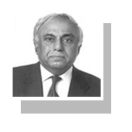By Stefan Dercon
Published in Dawn on April 09, 2024
OVER the last three decades, including as the chief economic adviser for the UK’s development work, I have witnessed economic transformation across large parts of the developing world. This transformation manifested itself in various forms, such as rapid income rises of Ghanaian farm workers, education access for generation of girls in rural Vietnam and Bangladesh, and transformation of cities in Indonesia and Cambodia. In this period, all these countries saw accelerating economic growth, well above 2.8 per cent on average.
I can only confirm what Pakistanis increasingly know: Pakistan has failed to join the ever-growing list of successful developing countries, with below 1.7pc growth across the last 30 years. It is facing a serious debt crisis. One-in-15 children now die in Pakistan before the age of five, double the rate of India, Nepal, or Bangladesh; almost half the children below five have a lower than healthy height for their age.
My recent book, Gambling on Development: why some countries win, and others lose, considered why some countries have succeeded in achieving transformational growth, while others missed the boat. Core to success was a ‘development bargain’, a broadly supported, politically inclusive commitment towards actions promoting growth and development across all groups with power and influence in politics, civil service, business, civil society, and the military; in short, across the local elite. Failures tend to stem from elites trying to eschew reform at all costs to keep their privileged positions.
Five lessons stand out for the new government to join the ranks of recent winners like Indonesia, Ghana, Bangladesh, or India.
Five lessons stand out for the new government.
Firstly, use the current crisis as an opportunity for economic reform. Across the world, a near-miss political or economic crisis has often been the spark for actions to promote growth: it happens when governing elites sense there is no other option but to reform, such as India in 1991. If the incoming government trusts that it will eventually gain legitimacy from pursuing painful policies in the short term, it can secure a strong legacy in the long run. Given Pakistan’s daunting and urgent challenges, there is perhaps no alternative.
Secondly, build a shared political commitment to achieve economic development and growth despite current political divisions. In countries where all key players have agreed to do whatever is necessary to achieve growth and development, this has often translated into continuity of implementation effort, even over several electoral cycles. Consensus on the necessary reforms, for example, on genuine privatisation or on taxation of all elite interests, will ultimately lead to success of the reform effort, as happened in India and Bangladesh.
Thirdly, use a strategy which is appropriate for your context. Pakistan needs an approach which can succeed in its own context, which is likely to mean reducing the role of the state in the economy, allowing markets to determine prices, including the exchange rate, and enabling private sector investment to drive growth.
Fourthly, ‘own’ the reforms and communicate them clearly to the public. The 1991 reform programme in India led by Manmohan Singh was proudly defended by the government and accompanied by clear and consistent public communications about why change was necessary, essential to gaining broad public support. Given that vested interests may try to block reforms, transparency on the costs and benefits of pursuing reforms can make it easier for the government, for example, how privatisation can save public resources, and how tariff reforms can facilitate export-led growth.
Fifthly, know that your own supporters should not be insulated from reform. Reform will be unsustainable if it excludes the tax and subsidy interests of the government’s supporters and other powerful institutions. By contrast, undertaking even a small number of targeted reforms would be enough to establish the credibility of the new government, building momentum. The current government will have to swallow bitter pills such as bringing retailers as well as large landowners into the tax net and removing sectoral policy preferences, such as protection of automakers.
Pakistan’s new government has a choice. Either it continues with business as usual, seeking external resources to keep the status quo, or it builds its own credible reform path, making it genuinely worthy of investment by external finance. In that way, it can build a legacy for itself by prioritising development: a legacy that creates a bright economic future for Pakistan.
The writer is professor of economic policy at University of Oxford. He has also served as chief economist of the Department of International Development; and development policy adviser to successive UK foreign secretaries.




